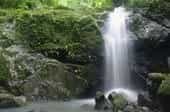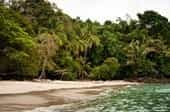TEFL International’s teacher training course in Manuel Antonio, Costa Rica is simply incredible. Besides training for your internationally recognized TEFL certificate, you’ll immerse yourself in lush jungle, swim in turquoise waters and relax on some of the most stunning beaches in the entire world.
Costa Rica is an absolutely amazing country and TEFL International is one of the most recognized and well-established training centers in the industry. It’s no wonder our course in Manuel Antonio has become so popular with people who wish to see the world from a new perspective. Once trained and certified, our teachers are able to travel to distant destinations and experience cultures in ways the average traveler could only envy.
TEFL Manuel Antonio, Costa Rica
Because it’s located on the Pacific Coast, opportunities for scuba diving, sunbathing and surfing are plentiful. Stay inland and you can trek over countless jungle paths while spotting over 350 different species of birds. Think of TEFL International’s certificate to teach English as a passport to exotic and fascinating job opportunities all over the world. Yet, after spending a month in Manuel Antonio, it’s a wonder why anyone leaves this tropical paradise.
Register now & get certified to teach english abroad!The School
TEFL Training Centre
The ITTT training centre is located in the beautiful Manuel Antonio area, in the town of Quepos, right next to the Manuel Antonio beach. The building has nine classrooms, including the TEFL room. The classrooms are open spaces so do not need air conditioning. The TEFL room and the Orientation room have air conditioning.
Inside the building, there are three apartments (available to trainees on a first-come, first-served basis), a large kitchen with a snack bar and free tea and coffee. The institute has a swimming pool. We recommend that each student bring their own pool towel, but we can also provide one at the institute if needed. There are five bathrooms, two downstairs with access for disabled students, and three upstairs. Three of the bathrooms have showers so that trainees can shower if they come from the beach or before/after the pool. The TEFL school building also has a coworking space, in case someone needs it to work.
15 minutes by bus from the public beach of Manuel Antonio, the TEFL training centre building is a five-minute walk from the marina, one or two minutes from the bus station, and there are a couple of pizza restaurants within 15 meters. The building has covered parking with a gate, along with 24/7 security.
Accommodation
Trainees on our Costa Rica TEFL course can choose from a number of different accommodation options, including home stay, private apartments and hostels. Those choosing the home stay option will need to contact us in advance. We will then be able to arrange for you to stay with a local family in Quepos. The home stay option includes a private bedroom in a family home and breakfast and dinner seven days a week. This is a great way to get an authentic experience of Costa Rica and to practice your Spanish skills at the same time. Please note that you should secure your home stay accommodation at least one month prior to the course start date.
We also have a list of recommended hotels, hostels and private apartments for trainees to choose from. Upon confirmation of your place on the course you will be sent an accommodation preference form to help you choose the option that is best for you. Accommodation availability is on a first-come first-served basis so you should let us know your preferences as soon as possible.
Course dates
2026
- 19 January 2026 - 13 February 2026
- 18 February 2026 - 17 March 2026
- 23 March 2026 - 17 April 2026
- 20 April 2026 - 15 May 2026
- 20 May 2026 - 16 June 2026
- 22 June 2026 - 17 July 2026
- 20 July 2026 - 14 August 2026
- 21 September 2026 - 16 October 2026
- 21 October 2026 - 17 November 2026
- 23 November 2026 - 18 December 2026
Course fees
The total price is divided into: deposit and balance.
The deposit may be paid via:
- Credit Card
- Paypal
- Wire transfer
- Western Union
The balance of the course fee must be paid by cash, PayPal or bank transfer directly to the training center before your course begins.
US$ 400
US$ 995
Accomodation Fees
The accommodation fees are not part of the course price and you are free to choose whichever accommodation option you prefer.
You are not obliged to use the accommodation options we provide so you are welcome to make your own accommodation arrangements if you wish. If you choose to use one of our accommodation options, it should be paid for directly to the provider prior to your arrival.
US$ 795
Private apartment
US$ 740
Host family, private room, two meals (breakfast and dinner)












